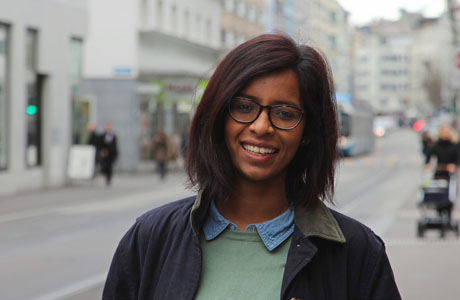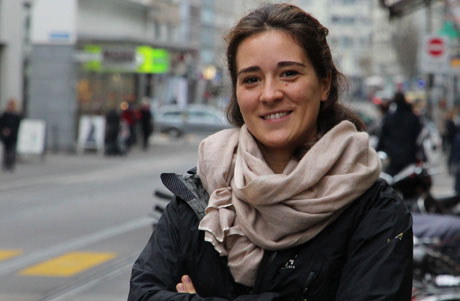A Place far Away
Many doctoral students at the URPP Asia and Europe leave their friends and relatives behind to do their research projects in Switzerland. Why did they decide to come to the University of Zurich and how do they feel being away from their native countries?
Roman Benz
Thiruni Kelegama decided to pursue her doctoral project at the University of Zurich for two main reasons. First, she was offered guidance by Benedikt Korf, a professor of human geography and a member of the URPP Asia and Europe, who, among other things, is a specialist in the political economy of the civil war in Sri Lanka. His knowledge on this topic is very helpful for Thiruni’s own project, which deals with governmental development projects and settlement politics both during and after the civil war in Sri Lanka. Secondly, Thiruni was attracted by the academic environment that the URPP Asia and Europe provides through its interdisciplinary approach: “It is extremely interesting and beneficial to talk to scholars from other disciplines and to see how they engage with their research area.” She became acquainted with other theoretical approaches and perspectives, which she considers to have broadened her approach.

Thiruni’s research looks at contentious forms of territorialization and settlement politics in northeastern Sri Lanka. Historically, as a largely peripheral scrub land, this area has assumed significance over the past decades as a contentious region between different ethno-political projects, militarized intervention, and claims on land. Focusing on the Sri Lankan government’s oldest development project and the highly militarized settlements that resulted from it, her doctoral thesis seeks to understand questions and dynamics related to processes of state formation at the margins of the state.
Having grown up in Sri Lanka, Thiruni has now lived outside of her native country for many years, pursuing studies of English literature and anthropology in New York and London as well as doing research as the SAARC Visiting Fellow at the Institute of Defence Studies and Analyses in New Delhi. Although it is always difficult for her to leave behind family and friends, she admits “that it gets easier with time.” She enjoys the whole process of settling in a new country, discovering it for the first time, and making new friends. Yet she is still considering a return to Sri Lanka when she is finished with her graduate studies—on the condition that she has the opportunity to remain in academia.
An opportunity to learn German
After Helena Wu earned her masters degree in comparative literature from the University of Hong Kong, she left her hometown in order to start her doctoral project in Zurich. She came to Europe mainly for her interest in Western theories and philosophy, which form the analytical framework for her research project. Furthermore she seized the opportunity to write her doctoral thesis under the supervision of Andrea Riemenschnitter, professor of Chinese studies and member of the URPP Asia and Europe. They met in Hong Kong in December of 2012 and, a few days later, Helena dispatched her application for an open position at the URPP.

Helena appreciates the interdisciplinary approach of the program, which allows her to exchange ideas with doctoral students and professors engaged in different academic disciplines: “Thanks to these interactions, I was able to improve my research design.” In her project, she works on Hong Kong cinema and literature after the turn of the millennium with a focus on the representation of place, thing and person in post-colonial Hong Kong.
Initially, it was difficult for her to leave behind friends and relatives. But she always could count on their support. They knew how important it was for her to study abroad. “In the meantime, they are happy, because they can visit me in Switzerland,” Helena adds. She enjoys their visits, and she made new friends in Zurich. From time to time, she still misses the food she was used to in Hong Kong.
The stay in Zurich gave her the opportunity to learn German. In the first year, she attended an intensive German class to learn the language from scratch. “For the speaking part, I still need to practice,” she says. But her time is limited, because she wants to focus first and foremost on her research.
The influence of individual decisions
In her doctoral project, Sofia Bollo compares different exhibition concepts of galleries and museums’ sections on Ancient China. Since the comparison includes art and ethnographic museums in Asia and Europe, Zurich turned out be the ideal place to pursue her research. When she was still applying to other universities with departments focusing only on Chinese studies, her broad comparative approach found little favor, but her proposal was accepted as highly relevant for the URPP Asia and Europe.

After receiving a B.A. in Chinese studies from the University of Turin, Sofia earned a masters degree with a major in ancient Chinese civilization at the School of Oriental and African Studies in London. Her doctoral project emphasizes museum studies, an emerging discipline that combines art history, anthropology, cultural studies, archaeology, etc. She is pleased that her approach is supported by the interdisciplinary research structure of the URPP. Her first supervisor, Hans B. Thomsen, is professor of East Asian art history, while her second supervisor, Mareile Flitsch, is professor of social and cultural anthropology and director of the university’s ethnographic museum: “Both supervisors are really helpful in providing the right theoretical background. They suggest many different readings, so that I have different points of view that I can combine together.”
At first, during an internship at the Museum of East Asian Art in Bath, she came up with the idea of comparing how Chinese curators represent ancient Chinese civilization through object exhibitions and how their European colleagues resolve the same issue. After starting her project, she realized that the geographical distinction between Asia and Europe was not as valid in terms of exhibition practices, because the individual decisions of directors and curators as well as the history of the collection play crucial roles. Even the kind of audience a museum wants to attract is more relevant for the arrangement of the objects than cultural differences between China and Western Europe.
Sofia decided to write a doctoral thesis mainly focusing on museum practices, because she intends to work at a museum later—preferably in Italy, her native country. It was difficult for her to leave behind friends and relatives in Genoa, when it was time for her to pursue her studies in Turin, London, and Zurich: “Probably, it was easier for me when I was in my early twenties.” Now she says it feels a bit more complicated, mainly because her husband still lives in Italy.
(Asia & Europe Bulletin, 4/2015, pp. 24–25)